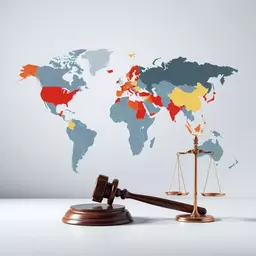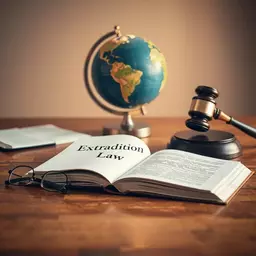Extradition Treaties and Legal Rights

Extradition treaties are crucial tools in the fight against international crime, yet their implications extend far beyond mere legal formalities. As these treaties define the complex dynamics between nations, they also safeguard the rights of individuals caught in their web. Understanding these treaties can empower individuals, legal practitioners, and policymakers alike.
What You Will Learn
- Extradition treaties facilitate international cooperation in criminal matters, ensuring fugitives cannot evade justice by crossing borders.
- Key principles such as dual criminality and political offenses exemptions shape the legal framework governing extradition.
- These treaties protect individuals against arbitrary detention and emphasize the right to a fair trial, thereby upholding due process.
- Judicial interpretations of treaties can significantly influence extradition outcomes, underscoring the need for skilled legal advocacy.
- Policymakers must balance international obligations with domestic legal standards to protect individual rights effectively.
- Legal practitioners should stay informed about evolving extradition laws and collaborate with international experts to build effective defense strategies.
- Continuous education on extradition law and human rights can empower professionals to navigate its complexities and advocate for necessary reforms.
Key Aspects of Extradition Treaties
Understanding the fundamental components of extradition treaties is crucial for navigating international law and its implications.
Dual Criminality
The act must be a crime in both countries involved in the extradition treaty.
Extraditable Offenses
Each treaty specifies which offenses are considered extraditable under its terms.
Political Offenses Exemption
Many treaties do not allow extradition for crimes deemed political in nature.
Legal Procedures
Clear guidelines outline how extradition requests should be submitted and processed.
Understanding the Legal Landscape of Extradition Treaties
The world of extradition is often complex and filled with legal nuances. At Extradition Interpol UAE, I strive to shed light on these intricacies. Understanding extradition treaties is crucial, as they form the backbone of international cooperation in law enforcement. For comprehensive legal support, consider consulting with experienced criminal defense lawyers in Dubai.
So, what exactly are extradition treaties? In simple terms, they are agreements between countries that outline the conditions under which a person accused of a crime can be sent back to the requesting country for prosecution or to serve a sentence. These treaties ensure that legal responsibilities are honored across borders, fostering international collaboration in the pursuit of justice.
Defining Extradition Treaties and Their Purpose
Extradition treaties serve several important purposes. Primarily, they aim to:
- Facilitate cooperation between countries in criminal matters.
- Ensure that fugitives cannot evade justice simply by crossing borders.
- Outline the legal processes and requirements for extradition requests.
These treaties also help clarify the legal obligations of each country involved, creating a structured approach to handling extradition requests. It’s essential for individuals, legal practitioners, and policymakers to understand these treaties' terms well to navigate the extradition landscape effectively.
Key Legal Framework Governing Extradition
The legal framework surrounding extradition varies from one treaty to another, but several core principles are often common. This framework includes:
- Dual Criminality: The act must be a crime in both countries.
- Extraditable Offenses: Each treaty specifies which offenses are extraditable.
- Political Offenses Exemption: Many treaties do not allow extradition for political crimes.
- Legal Procedures: Clear guidelines on how requests should be made and processed.
Having a solid grasp of these legal principles is vital, especially for individuals facing potential extradition. At Extradition Interpol UAE, we provide comprehensive insights into these frameworks, helping clients understand their rights and the legal avenues available to them. For more information on navigating international alerts, you can learn about navigating Interpol Red Notices and legal defense strategies.
Pro Tip
Navigating extradition treaties can be daunting. Here’s a valuable tip: always consult with legal experts who specialize in international law. They can provide crucial insights into specific treaties and help you understand your rights and options, ensuring that you are adequately prepared should you find yourself involved in an extradition case.
Summarizing the Essential Impact of Extradition Treaties
As we wrap up our exploration of extradition treaties, it's crucial to reflect on their significant impact on legal rights and protections. Extradition treaties serve not just as legal instruments, but also as lifelines for individuals caught in complex international legal systems. They establish a framework that balances the need for law enforcement with the fundamental rights of individuals, ensuring that justice is served without compromising human dignity.
Here are some key takeaways regarding legal rights and protections under extradition treaties:
- Extradition agreements establish legal protocols that protect individuals against arbitrary detention.
- They often include clauses that preserve the right to a fair trial, emphasizing the importance of due process.
- Human rights considerations play a pivotal role in determining whether extradition requests are honored.
- Judicial interpretations can shape how these treaties are applied, influencing outcomes for those facing extradition.
Key Takeaways on Legal Rights and Protections
Understanding the legal landscape surrounding extradition treaties is vital for both individuals and legal practitioners. These treaties not only facilitate cooperation between countries but also safeguard essential rights that could otherwise be overlooked. As I’ve seen through my work at Extradition Interpol UAE, ensuring these protections are enforced can significantly impact the lives of those facing extradition challenges. For more insights into how these laws operate, consider learning about extradition laws in the UAE.
It's also important to recognize that various factors influence how these treaties function in practice:
- The specific terms within treaties can vary widely between nations, affecting extradition outcomes.
- Judicial interpretations can either broaden or restrict the application of these treaties, emphasizing the need for skilled legal advocacy.
- Awareness of local laws and international obligations is essential for lawyers working in this field.
Implications for Policy Makers and Legal Practitioners
For policymakers, the implications of extradition treaties are profound. They must navigate the delicate balance between upholding international agreements and ensuring that domestic legal standards are met. As someone who is passionate about legal education, I believe that fostering dialogue on these topics can lead to smarter policies that protect individual rights while still addressing international crime.
Legal practitioners also face unique challenges in this arena. They need to remain vigilant about the evolving nature of extradition laws and the impact of landmark judicial decisions. Here are some considerations for practitioners:
- Stay updated on changes in international law that may affect extradition processes.
- Engage in continuous education to understand both procedural and substantive legal nuances.
- Collaborate with international legal experts to build a comprehensive defense strategy for clients.
Encouraging Further Exploration and Dialogue on Extradition
As we conclude, I encourage you to delve deeper into the world of extradition law. It’s a complex but fascinating field that affects many lives, and your engagement can lead to meaningful change! By fostering discussions around best practices and advocating for legal reforms, we can better protect the rights of individuals facing extradition. You can also explore defense strategies for extradition cases to gain a deeper understanding.
Here’s a call to action for those interested in promoting legal reforms and improving practices in this area:
- Participate in forums or workshops focused on extradition law and human rights issues.
- Advocate for clearer, more protective language in extradition treaties.
- Support organizations that work to protect the rights of individuals in extradition cases.
Resources for Continued Learning on Extradition Law
To further your understanding of extradition law, I recommend exploring the following resources:
- Books and articles focusing on international law and human rights.
- Legal databases and journals that cover recent case law and treaty interpretations.
- Online courses or webinars offered by legal associations specializing in international law.
By continuously seeking knowledge, we empower ourselves and others to navigate the complexities of extradition law more effectively. Together, let’s work towards a legal landscape that honors both justice and human rights!
Frequently Asked Questions (FAQs)
1. What are extradition treaties?
Extradition treaties are formal agreements between countries that establish the conditions under which a person accused or convicted of a crime in one country can be transferred to another country for prosecution or to serve a sentence.
2. Why are extradition treaties important?
They are crucial for international cooperation in law enforcement, preventing fugitives from evading justice by crossing borders, and ensuring legal responsibilities are honored across nations. They also protect individuals' rights by outlining due process.
3. What is "dual criminality" in the context of extradition?
Dual criminality is a key principle stating that an act must be considered a criminal offense in both the requesting country and the requested country for extradition to proceed.
4. Are political offenses subject to extradition?
Many extradition treaties include a political offenses exemption, meaning that individuals accused of crimes deemed political in nature are often not subject to extradition.
5. How do extradition treaties protect individual rights?
These treaties often include clauses that protect individuals against arbitrary detention, emphasize the right to a fair trial, and ensure human rights considerations are taken into account when determining whether to honor an extradition request.
6. What role do legal practitioners and policymakers play in extradition?
Legal practitioners provide crucial insights, defend individuals, and navigate complex legal frameworks. Policymakers must balance international obligations with domestic legal standards to ensure individual rights are protected while addressing international crime.
Recap of Key Points
Here is a quick recap of the important points discussed in the article:
- Extradition treaties are agreements between countries that determine the conditions for returning accused individuals for prosecution or sentencing.
- Key purposes of extradition treaties include facilitating international cooperation, preventing fugitives from evading justice, and outlining legal processes for extradition requests.
- Core legal principles governing extradition often include dual criminality, the specification of extraditable offenses, political offenses exemptions, and established legal procedures.
- Extradition treaties play a significant role in protecting individual rights, ensuring fair trials, and considering human rights in extradition requests.
- Legal practitioners must stay informed about changes in international law and collaborate with experts to build effective defense strategies for extradition cases.
- Policymakers are encouraged to uphold international agreements while ensuring that domestic legal standards protect individual rights.



